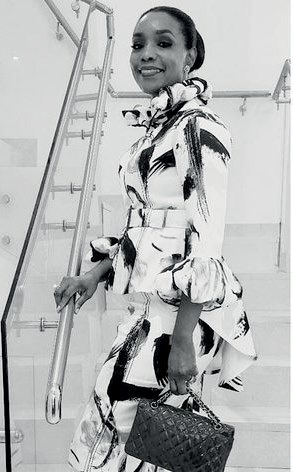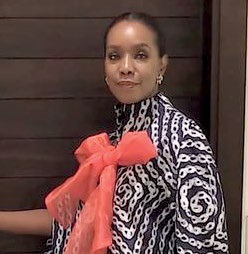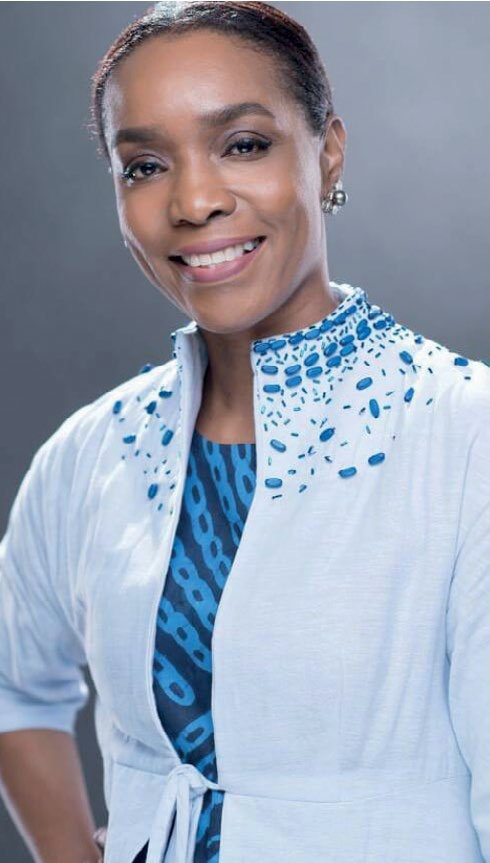November 12, (THEWILL) – Image branding specialist, Ngozi Princewill Utchay, speaks with IVORY UKONU about her profession and how her skills can be used to help business executives, entrepreneurs, fast-rising professionals and high-profile individuals polish, project and optimise their corporate or social image, using a sophisticated approach and global best standards. Excerpts:
How did you get into image and personal branding?
I believe that we are all born with different gifts and anything that comes fairly effortless to one is usually a gift. Image branding is something that I have always done informally because people have always pointed it out to me. For instance, if someone wants to do something or put together an outfit and seeks an opinion, I am usually the go-to-person. I think that is how it all started. When people hear today that this is what I do, they are truly not surprised because this is me. They say I have always had that grace and elegance. I think it’s just something I was meant to do and so I transitioned from doing it informally to formally and it keeps getting more defined. You know, with greater definition comes greater fulfillment in what you do.

You studied French language at the University of Ibadan. Knowing how particular French people are about etiquette, would you say that sort of contributed to you getting into image branding as a career?
Yes, I did study French with a minor in German at the university, but I don’t know if it’s that or the other way round. I did so well in my A levels that I could have done any other course, but I chose to study French. In a sense, I guess it had already chosen me because I love languages. Besides there was no pressure to do anything because we already had a lawyer, an engineer, etc., in the family and so I could do what I wanted. My father thought I would go into diplomatic service, but I sort of charted my way and gravitated towards the things that I enjoy doing.
What were you doing before settling for image and personal branding as your career?
When I first got married, I joined my husband in building our hospitality business, the Prime Group, which includes the popular Prime Chinese Restaurant. But before then, I worked in the French Embassy, that is, in the cultural department. You know, like I said, I wasn’t under pressure, I have always done things that I enjoyed doing. I also worked with the Trinidad and Tobago High Commission. I have always sort of gravitated towards that scene.
At the time you started, there were not too many people doing image and personal branding. Did you ever think you would succeed at it?
I think that when it comes to passion, when you over think it, you may not likely start. I think you should just go with the love you have for whatever it is that you are doing. I wasn’t thinking of failure when I started. I felt assured about the way it would go and since I started, so many more people have gone into it. The more important part of this is that I blended two things that I hadn’t seen anyone else practise together. I really just want to see people discover and develop their authentic selves. And now I see more people doing etiquette and combining it with personal branding.

Isn’t there a difference between etiquette and image branding?
From an insider’s point of view, they are two very different things. If you take, for example, public relations with image, you are presenting yourself and so the PR aspect would be a public perception of you. Although they are connected, etiquette and personal branding are not traditionally lumped together.
To a lay man, how would you distinguish etiquette from image branding?
They are actually three: Etiquette is how you interact with other people. Image is your overall self-presentation and how you see yourself, while branding has to do with perception and your reputation.
How well received was image consulting when you began to market it?
It was very well received. When I started the now rested ‘Genevieve’ Magazine made me an offer as a columnist. Also, companies were calling me to give them proposals. So, people saw the value of what I was offering and keyed into it. I have always said that if people don’t understand what you offer or if it is new to them, then it is a fantastic opportunity for you. It means that the field is wide open and there is so much potential for you to build on it.
Besides teaching Business and Dining Etiquette at the Lagos Business School, do you own a finishing school?
For now, I run the programme once in a year and so, I don’t know if there is any point dedicating the entire year to maintaining a finishing school. It is something that I am building up at my own pace, I am not under any pressure or working with anyone’s timeline. But with time, I know it will crystallise. I have a vision in my head on how I want to go about it, but for now it is a school that converges annually and after the cycle, we look forward to another. It is more cost effective that way.
You are the host of ‘Future First Ladies’. What is the story behind it?
I started it in 2015. A lady that I admire approached me to put together something for her daughter and some of her friends, you know, just to teach them basic things that they need to do. That is how it started. But you know what I said earlier about definition, in fact with time it metamorphosed into a mentorship programme.
People like to restrict the title ‘first lady’ to wives of governors or Heads of State or even pastor’s wives, but this is quite limiting. A definition from Collins Dictionary for instance, talks about leading ladies in a particular profession. So, it’s not just about the wife of a governor or pastor.
Our goal is to prepare young ladies to be leaders in a fully rounded way. I have had outstanding women in different fields of human endeavour become parts of this highly subsidised annual finishing school that aims to ‘democratise’ the traditional finishing school for the benefit of the wider society, while also providing mentorship. I am very interested in people being fearless about pursuing their dreams, being themselves, going out to actualise their own vision. You know, being equipped for life, so to speak, because when you don’t know, you are likely to make mistakes. Ignorance is not bliss; it is actually quite dangerous.
The annual school gives attendees as much information as possible, including little things, such as how to carry oneself and how to sit on a stage. Little things you that help one to be graceful, you know. It isn’t just your talent or your business ability that can carry you through. If you are building a brand, there are other things that one has to be aware and conscious of. For instance, how do you handle office politics and how do you handle office culture? How do you identify role models or interact with them? So, the school is more or less like a big sister giving a younger sister advice or life lessons.

Speaking of First Ladies, have you had sessions with any?
There have been opportunities. Informal ones. There is always an element of discretion in this work.
Gender wise, who are your biggest clients?
I organise training sessions for organisations. In that case, it is a fusion of both sexes. However, I love to work with women. Many of the conferences I get invited to are conferences that have to do with women empowerment, like the Women in Business (WiMBiZ).
Does this mean that men are not particularly receptive to personal and image branding?
I feel that perhaps people are more comfortable having one on one sessions with members of their own gender because I have a male friend who is equally doing well in this field and has quite a number of male clients. So, it all boils down to who you are more comfortable sharing intimate details or what they consider embarrassing. That is what I suspect.
What has been your biggest challenge in this business?
I haven’t seen any big challenge in a sense that anything that could present itself as a challenge I have seen as an opportunity or something that I had to find a way to resolve. Again, when you see obstacles, you have to find your way around them and not allow yourself to be discouraged. I know that some people who may not be well trained in this business pull things off the internet and pass it off as theirs. I don’t see them as a challenge. That happens in Nigeria with every profession. If they see that some money could be made from something, they jump on it immediately, whether they like it or not, certified or not and not even minding that they may be misinforming people.
Is your profession regulated in Nigeria?
Not quite. It will require a lot of work to get that done. But I do think that if you are going to teach something, at least be sure of what you are teaching and just have some form of integrity.
What has been the most striking feedback you got from your client since you embarked on this journey?
I really don’t want to sound immodest, but I have gotten very good feedback. I love speaking and what is most important to me is being able to pass knowledge or make somebody see things they couldn’t see before; help open their minds to endless possibilities. I love to see people grow confident in themselves. Nevertheless, I have had fantastic feedback from the work I do.
How do you think image perception and branding can help change the current narrative about Nigeria to the outside world?
Before we start rewriting, we need to do some form of housekeeping. I am not comfortable with us just putting out a cosmetic image out there. It has to be more natural, working from the inside out. There are some things about Nigeria that need to be promoted constantly, such as how Nigerians are very hospitable and creative people. We are doing so much with so little, in spite of our infrastructural problems. There is also the Nigerian spirit, which is resilient. It doesn’t matter what you throw at Nigerians, they will make a joke out of it and I think that is very special.
We help to run a few other countries. So, there is something about Nigeria that can’t be ignored. Despite the fact that there are a few misguided ones who think fraud is the way out, there are many Nigerians who want to do the right thing. These are the facts and figures that we need to compile and put out there as well, to counter whatever negative narrative about Nigeria that is out there and begin to project the good things about us.
We need to curate our own image by compiling things that are unique about us that the world needs to hear about. We can’t leave it to other people to do for us. Also, patriotism has a huge role to play in all these. We can’t go out there and trade insults and pull down one another. The world will help us do that more. A lot of work needs to be done, but it can be done simultaneously; put out a more balanced perspective while also working on our psyche as a nation.
The younger generation seem to be detached from reality; they are generally not in sync with some things that are important enough to shape their lives. How can image branding and perception help to correct this?
Image starts from within you. If everyone thinks, for instance, that you are good at what you do but you don’t believe it, no matter how many people tell you, you will still doubt yourself until you actually begin to see and believe in yourself.
My thinking is that the social media has a lot to do with how detached the youths are. The cyber world influences them so much that may not even reflect reality. And so, depending on how much they have given themselves to that cyber world, they cannot detach it from reality. For me, it’s quite sad and this is one of the reasons why I work with the youth.
It is very important that we pass on the right values because we have seen the statistics, there are lots of casualties. We have to stop, think and begin to equip them with the right tools needed to succeed in life. It is a huge concern and the earlier we rein it in, the better.

What would you consider your biggest achievement in life so far?
Just remaining true to myself. There is a lot I choose to walk away from because I don’t think it is authentic. I want to run the race that God has given me. I don’t want to run anyone’s race. I want to run mine and be contented doing it.
What would you say must have significantly shaped you to be who you are today?
My faith. I am a Christian. I realize that I have a God who loves me so much and I put my hand in his and walk with him every day. They say when you kneel before God, then you can stand before any man. So, if God’s approval is most important to me, then I am going to be able to easily turn down things that God will not approve of.
You do have a very peculiar style. You are always in navy bue, black, red and white. Any particular reason why you are drawn towards these colours?
Maybe because I like simplicity. That is not to say I don’t admire what others wear, but for myself, I like simple clean lines and that defines me because they suit me.
What are some of the things you enjoy doing when you aren’t working?
I am a tennis enthusiast, I collect African art and I am an amateur artist.





